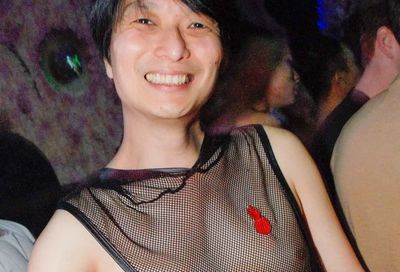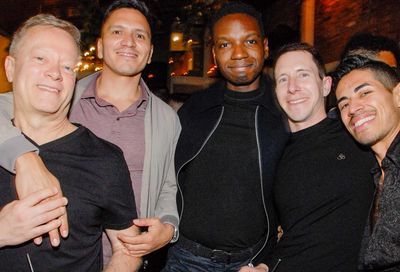LGBTQ Candidate Spotlight: Jason Andrean believes DC’s future relies on a better school system
Andrean was warned that his sexuality could be a problem for State Board of Education voters, but he says that's not the case

This article is part of a series highlighting local LGBTQ candidates running in the 2018 elections. The opinions and political beliefs expressed in this candidate spotlight do not necessarily reflect those of Metro Weekly, its employees, or its contributors.
Jason Andrean’s first experience with the D.C. educational system was in 2007, when he was searching for a preschool program for his two-year-old daughter. But, like many parents, he opted to move his daughter, now 13 years old, out of the district due to what he perceived to be a lack of high-quality options.
“The schools back then, before they pushed to reform schools, didn’t provide the same level of quality education that her mom and I had grown up with,” says Andrean, the son of Jamaican immigrants raised and educated in East Ramapo, N.Y. “We didn’t go to rich public schools, but we went to public schools that had quality teachers and did an awesome job educating the two of us. We wanted the same experience for our daughter.”
It’s that same desire to expand educational opportunities for other children that has prompted Andrean, a 35-year-old bank manager and longtime community activist, into the race for the Ward 1 seat on the State Board of Education.
“I’m in this race because I want to make sure that the same quality of education that I had growing up — that was able to open doors for me, and set me up to live a successful life — I want to make sure that every child in the district has that opportunity,” he says.
Education and youth advocacy are passions for Andrean, who has served as a board member of Achievement Prep Public Charter School, Democrats for Education Reform, and the Boys & Girls Clubs of Greater Washington.
“I’m running on a platform of prioritizing equity in our public school system,” he says. “I think we have to be honest that with a majority of our students being considered disadvantaged students, being children of color, we have to do everything we can to support those children so we can close the achievement gap…. What I want to see us do, as a system, is support the least among us. That doesn’t mean we take away from affluent families. It does mean we double-down and support the poor families.
“I think there has to be a larger conversation about that at the State Board of Education, to play a role in that in terms of re-evaluating our graduation standards and the role we can play in helping to advocate for these changes,” Andrean adds.
Andrean says one of the complaints he hears most from principals and parents is that the resources allegedly allocated to schooling are not actually benefiting students. That’s why he supports an audit to ensure taxpayer dollars are being spent wisely and to track where those dollars are going.
“There’s an intersectionality of issues that affect our children, and it may mean more funding for out-of-school programs. It may mean more finding ways to get mental health and general health support in our communities, so that we can address those issues,” he says. “It may mean that we may need to come up with more creative ways for affordable housing. There are issues that our families experience that don’t have their origin in the classroom, but manifest themselves when children show up at school. I think that the conversation needs to be broader than just, ‘Hey, we need more money in education.’”
To accomplish those aims, Andrean says the State Board of Education must develop good working relationships with the D.C. Council, which has the final say over whether to implement the SBOE’s recommendations, as well as education funding.

Andrean supports many of the reform-minded changes made in education over the last decade, including establishing mayoral control over the schools and taking politics out of the SBOE by having its members serve in a limited role. But that doesn’t mean that the race isn’t important or shouldn’t attract voters’ attention.
“I think all people should be concerned about the quality of our education system in America and in D.C.,” he says. “I think that if you are a voter, if you’re a resident, if you are a taxpayer, you have something at stake.
“I think the future viability of our city hinges on the quality of education,” Andrean adds. “You can’t be a first class city and not have first class education system. I had a teacher, Mrs. Robin Shamberg, who taught me in tenth grade and twelfth grade and she would also say, ‘Without an educated populace, Jason, the democracy will fail.’ Our democracy’s dependent on it, the viability of our city is dependent on it.”
For Andrean, who has been endorsed by the LGBTQ Victory Fund in his race, his sexuality and the fact that he has a partner have not been an issue for voters.
“I thankfully have not gotten any negative comments related to my sexual orientation, even though I was warned by some openly LGBTQ folks who had run previously in the District that they had gotten comments such as ‘Shouldn’t you be at Nellie’s?’ or something like that,” he notes. “Comments that weren’t openly anti-gay but clearly had an air of: ‘Why would a gay person be interested in improving our schools?'”
But he also says he’s not going to shy away from it if someone brings up his orientation or the Victory Fund endorsement.
“I’ve got to run on my values and I’ve got to run authentically,” he says. “People want authentic leadership. Here it is.”
Andrean says the chief reason Ward 1 residents should consider voting for him is his record of community engagement in the education sector, especially among lower-income communities where schooling options are not as widely available.
“I think I bring a diversity of thought to how we should think about education,” he says. “If you’re preparing children to get jobs, it would make sense to have somebody who works in the job force, who works in the American economy and can say, ‘Look, this is where I think the deficiencies are, this is what we see when children ultimately graduate from college, where the deficiencies are.’ I bring those perspectives.
“I also bring the perspective of an immigrant,” Andrean adds. “Ward one has a large immigrant population. My parents were immigrants from Jamaica. I grew up in the immigrant community in New York. I’m aware of the issues, the language barriers, and the other cultural barriers that communities in our ward face and I’m happy to advocate for them and make sure that they have a seat at the table.”
Support Metro Weekly’s Journalism
These are challenging times for news organizations. And yet it’s crucial we stay active and provide vital resources and information to both our local readers and the world. So won’t you please take a moment and consider supporting Metro Weekly with a membership? For as little as $5 a month, you can help ensure Metro Weekly magazine and MetroWeekly.com remain free, viable resources as we provide the best, most diverse, culturally-resonant LGBTQ coverage in both the D.C. region and around the world. Memberships come with exclusive perks and discounts, your own personal digital delivery of each week’s magazine (and an archive), access to our Member's Lounge when it launches this fall, and exclusive members-only items like Metro Weekly Membership Mugs and Tote Bags! Check out all our membership levels here and please join us today!





















